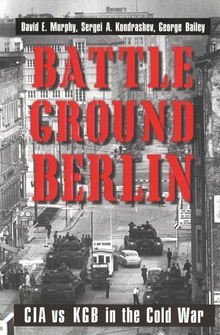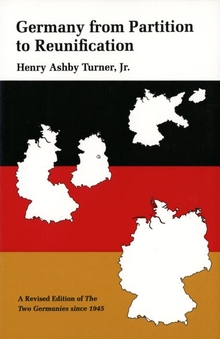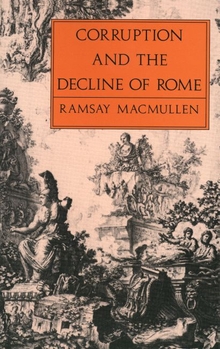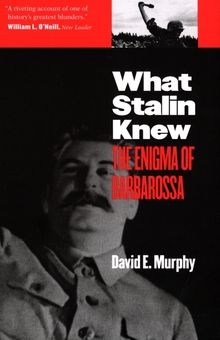Battleground Berlin
WARNING
You are viewing an older version of the Yalebooks website. Please visit out new website with more updated information and a better user experience: https://www.yalebooks.com
CIA vs. KGB in the Cold War
David E. Murphy, Sergei A. Kondrashev, and George Bailey
Out of Print
Battleground Berlin illuminates some of the most compelling mysteries of the Cold War, including:
· what really happened the night the Soviets "discovered" the Berlin Tunnel;
· who ordered the building of the Berlin Wall—and why did the West seem so ill prepared;
· how did infighting among Soviet leaders affect decisionmaking during the most critical moments of the Berlin crisis;
· how did power struggles between KGB and its protégé, the dreaded East German security service, shape the political landscape of East Germany and heighten tension in West Berlin;
· how much did the famous defector Otto John reveal to KGB—and why is he still unable to clear his name;
· and much more.
The book, an operational and organizational history of the world’s two most important secret service organizations during a critical time, unveils the vital connection between intelligence gathering and political decisionmaking at the highest levels. Full of intrigue and suspense, it is a story not to be forgotten.
A selection of the Conservative Book Club and the History Book Club
"Written with great authority, original research, skillful analysis, and a unique perspective, this book tells the definitive story of the U.S.-Soviet intelligence war in Berlin in the first phase of the Cold War."—Edward Jay Epstein
"A troika of erstwhile adversaries team up to deliver an absorbing and authoritative inside view of how American and Soviet-bloc intelligence agencies plied their offbeat trade in divided Berlin during the first 15 years of the Cold War. . . . Eye-opening detail on cloak-and-dagger operations in a conquered capital city that once threatened to alter the balance of world power and breach the world's hard-won peace."—Kirkus Reviews
"A balanced and authoritative history that spans a crucial time and place. . . . [This book] breaks new ground, and if it is neither the complete story nor the last word, it has pointed the way for others. Documents without eyewitness interpretation can be sterile and misinterpreted; personal memories without documents are inevitably selective and sometimes self-justifying. The authors have successfully brought them together."—Markus Wolf, Los Angeles Times
"A fascinating and important new account of the opening campaigns of the secret cold war waged by the CIA and the KGB which retells in detail, much of it new, the ways in which Soviet and American intelligence services fought their secret, bloodless war."—Thomas Powers, New York Review of Books
“Timely and important.”—Christopher Wilcox, New York Sun
"Rarely if ever before has such a complete and authoritative insiders' account of the game of espionage ever been put into a single volume. . . . The overall picture that emerges in this account is one of the tremendous difficulty the Russians experienced in the face of the fact that West Germany was rapidly becoming far more prosperous and powerful than the East. That is what led ultimately to the construction of the wall in 1961 and the end of the phase of the espionage battle so comprehensively outlined in this book."—Richard Bernstein, New York Times
"The first account of espionage in the city that represented the front line of the cold war as seen from both sides. . . . The book does present a remarkably balanced view of the Berlin spy wars."—Joseph E. Persico, New York Times Book Review
“A first-rate read from a man who knows the intelligence business. Five cloaks, five daggers.”—Joseph C. Goulden, Washington Times
"This is a major contribution to the intelligence history of the Cold War."—Eliot A. Cohen, Foreign Affairs
"Provides much useful background on how the U.S. could predict Soviet reaction to the Berlin airlift and what really happened in connection with the famous 'Berlin Tunnel' in the late 1950s. . . . A valuable aid to comparing U.S. and Soviet intelligence operating 'eyeball to eyeball' over the course of its time span."—Booklist
"A classic of modern intelligence literature drawn from archives and personal recollections. . . . Moles, double-agents, Soviet antisemetic disinformation campaigns, dead drops, recruitments—the stuff that makes good spy novels, with the welcome blessing of being factual. If you read no other intelligence book this season, make it this one."—Joseph Goulden, Washington Times
"Battleground Berlin breaks new ground. By utilizing Kondrashev's access to KGB documents, the authors were able to project the years of critical embroilment both as they were experienced at the CIA's Berlin operating base, BOB, and at the KGB intelligence compound, Karlshorst."—Burton Hersh, St. Petersburg Times
"Students of espionage and counter-espionage will find fascinating accounts of both famous and previously secret episodes."—Robert Dean Pope, Richmond, VA Times-Dispatch
"The two authors have produced an account which shows, with the support of recently-opened archives, how the two organisations evolved their strategies in the aftermath of World War Two. . . . There are many people around today who are nostalgic for the Golden Age of spying, and this book is essential reading for them and indeed for anyone interested in twentieth century history and politics."—British East-West Journal
"Now [the authors] have written a book about the real Berlin of the Cold War. . . . There has been nothing like this book in all the preceding literature on Cold War espionage. It is sober, authoritative, unsensational, documented, and revelatory of two very different world views. Finally, it is also a fascinating read."—Julius W. Friend, History: Reviews of New Books
"It is a remarkable story and one that argues convincingly that the CIA's contribution to the Cold War made a real and positive difference. Former intelligence officers will read Battleground Berlin to fill in some gaps. Historians will read it to amend conventional wisdom. Revisionist scholars will ignore it at their peril."—Hayden B. Peake, CIRA Newsletter
"Battleground Berlin is a captivating book, rich in factual material. It can be recommended no only to specialists in intelligence and foreign policy, but to anyone who is interested in the details of the history of the Cold War."—Oleg Gordievsky, Times Literary Supplement
"Battleground Berlin provides fascinating reading for those wishing to gain perspective on one of the more tense arenas in twentieth-century history."—Betty J. Glass, Journal of Government Information
"Adds new information and insights to the tale of rival powers....the author’s extensive complementary knowledge of events in Germany enhances the book."—Library Journal
"With the Cold War hatchet buried . . . two former spies . . . offer a detailed view of what their very different agencies actually did in that crisis-ridden era."—Gabriel Schoenfeld, Wall Street Journal
"Gripping. . . . A remarkably balanced view of the Berlin spy wars."—Joseph E. Persico, New York Times Book Review
"Remarkable . . . a fascinating document of the still-bewildering "wilderness of mirrors" the K.G.B.-C.I.A. battlefield has become."—Ron Rosenbaum, New York Observer
"Battleground Berlin, an unusual and very important volume, is the collaborative effort of three men who witness the East-West struggle on the front lines."—Jefferson Adams, Intelligence and Counterintelligence
"Most interesting to experts on the history of intelligence, who will find plenty of new information on such operations as the famous tunnel the CIA has dug below the Soviet sector of Berlin in the mid-fifties to penetrate Soviet and East German telephone communications. In addition, readers get useful insights into the organizational structures of American and Soviet intelligence."—Manfred Berg, Journal of American History
"The appeal of this volume lies in the light it sheds on the intelligence underpinnings of the dramatic political eruptions that affected Berlin and therefore the whole fabric of East-West relations during the period under review."—Melvin Croan, Journal of Cold War Studies
"An important, often fascinating, account of the East-West espionage efforts in perhaps the most critical arena of the Cold War. It belongs on the bookshelf of any serious students of that conflict."—Ronald E. Powaski, Slavic Review
Publication Date: August 19, 1997
20 b/w illus.








